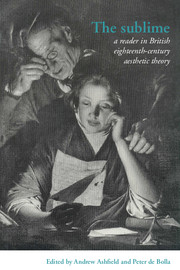Book contents
- Frontmatter
- Contents
- List of Abbreviations
- Introduction
- Part I The Longinian tradition
- Part II Rhapsody to rhetoric
- Part III Irish Perspectives
- Part IV The Aberdonian Enlightenment
- Part V Edinburgh and Glasgow
- 34 A treatise of human nature (1739-40)
- 35 A critical dissertation on the poems of Ossian (1763)
- 36 Lectures on rhetoric and belles lettres (1783)
- 37 Elements of criticism (1765)
- 38 Essays on philosophical subjects (1758/1795)
- 39 The theory of moral sentiments (1759/1790)
- 40 An essay on the history of civil society (1767)
- Part VI From the Picturesque to the Political
- Sources and further reading
39 - The theory of moral sentiments (1759/1790)
Published online by Cambridge University Press: 05 June 2012
- Frontmatter
- Contents
- List of Abbreviations
- Introduction
- Part I The Longinian tradition
- Part II Rhapsody to rhetoric
- Part III Irish Perspectives
- Part IV The Aberdonian Enlightenment
- Part V Edinburgh and Glasgow
- 34 A treatise of human nature (1739-40)
- 35 A critical dissertation on the poems of Ossian (1763)
- 36 Lectures on rhetoric and belles lettres (1783)
- 37 Elements of criticism (1765)
- 38 Essays on philosophical subjects (1758/1795)
- 39 The theory of moral sentiments (1759/1790)
- 40 An essay on the history of civil society (1767)
- Part VI From the Picturesque to the Political
- Sources and further reading
Summary
Part I. Of the propriety of action
Section I. Of the sense of propriety
Chapter V. Of the amiable and respectable virtues
Upon these two different efforts, upon that of the spectator to enter into the sentiments of the person principally concerned, and upon that of the person principally concerned, to bring down his emotions to what the spectator can go along with, are founded two different sets of virtues. The soft, the gentle, the amiable virtues, the virtues of candid condescension and indulgent humanity, are founded upon the one: the great, the awful and respectable, the virtues of self-denial, of self-government, of that command of the passions which subjects all the movements of our nature to what our own dignity and honour, the propriety of our own conduct require, take their origin from the other. …
And hence it is, that to feel much for others and little for ourselves, that to restrain our selfish, and to indulge our benevolent affections, constitutes the perfection of human nature; and can alone produce among mankind that harmony of sentiments and passions in which consists their whole grace and propriety. As to love our neighbour as we love ourselves is the great law of Christianity, so it is the great precept of nature to love ourselves only as we love our neighbour, or what comes to the same thing, as our neighbour is capable of loving us.
- Type
- Chapter
- Information
- The SublimeA Reader in British Eighteenth-Century Aesthetic Theory, pp. 244 - 252Publisher: Cambridge University PressPrint publication year: 1996
- 19
- Cited by



